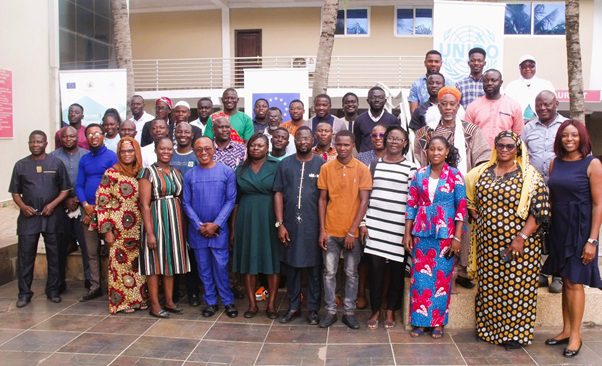Issues of conformity to standards, product regulation and product safety in general have become key considerations influencing the choices of today’s consumer and many markets require products reaching their regions to have acquired certain certification, quality or at the minimum, be registered by national conformity bodies.
As Ghana works to transform from a raw material-based country to a sustainable, industrial nation and scale up its sustainable structural transformation, it is imperative that the cosmetics, cassava and fruit value-chain integration at regional and national levels is strengthened.
As part of a joint effort by the United Nations Industrial Development Organisation (UNIDO), Government of Ghana, and the European Union (EU) to sustain the future of the manufacturing eco-system, another session of quality assurance training workshops has been organised for 50 “One District One Factory” (1D1F) companies.
The capacity-building session, which was targeted at factories and small-scaled manufacturers in the middle and northern zones of Ghana, was held in Kumasi from 25th to 26th October, 2022.
The UNIDO Chief Technical Advisor for WACOMP-Ghana, Mr Charles Kwame Sackey, revealed that the processors of cassava, shea and fruits products, face a myriad of practical challenges which impact the safety and quality of their final products, especially for the international market.
“The training session aimed to support 1D1F enterprises, to improve and sustain quality, hygiene and good manufacturing principles to minimise the risks associated with production and to improve product quality,” he said.
He further stressed that “avoiding contamination and improving efficiency are very important components of WACOMP and for the European Union.”
Mr. Sackey added that the One District One Factory Secretariat and UNIDO are committed to ensuring that products are consistently produced and controlled according to the prescribed quality standards.
The Chief Commercial Officer and Head of the government’s flagship 1D1F Initiative, Kofi Addo, recounted that in March 2020, the Secretariat and UNIDO agreed to support the beneficiary factories and SMEs of the programme to implement the appropriate standards in food safety and quality management to enhance competitiveness and market access.
“The feedback from selected quality assurance officers of 1D1F companies after the first training in Accra, on the 29th and 30th August, 2022, has been very positive as standards have improved,” he noted.
“We are glad those in the northern and middle zones too, will now get to impart knowledge to other factories.”
The collaborative exercise by these key stakeholders envisages enhancing the skills of new entrants in the manufacturing eco-system, to improve compliance to standards.
80 factories have so far benefitted from the partnership between the Ministry of Trade and Industry (MoTI) and WACOMP – Ghana.


